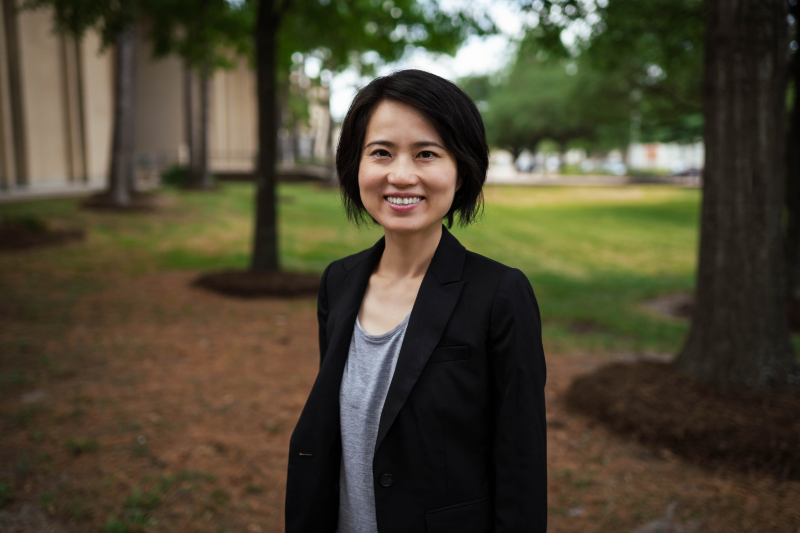When given the opportunity to join the faculty of the Industrial Engineering Department at the Cullen College of Engineering, Yisha Xiang pointed to the facilities and the proximity to major industries as significant factors for her decision.
“My research interests involve data-driven decision-making under uncertainty and statistical machine learning with a variety of applications, including manufacturing, health, infrastructure and energy systems,” she said. “UH has world renowned faculty members working on cutting edge research in these areas. I’ve collaborated with UH professors and researchers several times in the past. Now that I’m at UH, I look forward to building new and stronger collaborations with outstanding faculty and researchers at UH.”
She added, “Moreover, the city of Houston is the energy capital of the world and houses the largest medical center in the world. It provides tremendous opportunities for industrial partnership, generating broader real-world impacts. All these are great for the growth and success of my research program. The greater Houston area offers state-of-the-art recreational facilities, world-class arts and cultural activities, excellent schools and affordable housing. We look forward to our new chapter of life in Houston.”
Xiang joins the Cullen College of Engineering as an Associate Professor for the Fall 2022 semester. Prior to joining UHIE, she was E. L. Derr Assistant Professor of Industrial, Manufacturing and Systems Engineering at Texas Tech University. She had also taught at Lamar University and internationally. Xiang earned her doctorate and M.S. from the University of Arkansas in 2009 and 2006, respectively, and her B.S. from the Nanjing University of Aeronautics & Astronautics in China.
Xiang's research was selected for an NSF CAREER award in April 2020, while she was at Texas Tech. The funding supports early-career faculty who have the potential to serve as academic role models in research and education and to lead advances in the mission of their department or organization. The grant, “Enhancing Environmental and Economic Sustainability of Additive Manufacturing-based Remanufacturing,” is for $508,805 and runs through an estimated end date of August 2025.
Xiang said the research aims to enhance the environmental and economic sustainability of “additive manufacturing-based remanufacturing.” Broadly, remanufacturing is the rebuilding of a product to the specs of the original manufactured product using a combination of reused, repaired and new parts.
“Remanufacturing has emerged as a critical element for realizing a sustainable manufacturing industry in the past decade,” she said. “Recent progress in additive manufacturing provides unprecedented capabilities for remanufacturing that cannot be achieved with traditional manufacturing counterparts. However, current remanufacturing practices mainly concern end-of-life products, many of which are no longer remanufacturable due to severe damage. Moreover, contrary to the conventional wisdom that remanufacturing reduces environmental impacts, it can, in fact, lead to negative outcomes, like consuming more energy, without an in-depth understanding of the decision’s effects and environmental uncertainties.”
Xiang noted two other issues with current efforts to expand remanufacturing.
“It is significantly limited due to the high cost of remanufacturing equipment, which affects small-size companies that make up the majority of remanufacturing needs,” she said. “Also, low-volume demands do not support 'mass production.' There is a lack of integrated knowledge that can aid in planning, controlling, and managing of remanufacturing operations.”
This is where her research steps in.
“My CAREER grant will fill this gap in knowledge by providing new and innovative models and problem-specific algorithms to support decision-making for remanufacturing operations. Specifically, in order to address the environmental uncertainty and mitigate the risk of substantially reduced remanufacturability at the end of a product’s life, a data-driven proactive remanufacturing planning framework will be developed to identify the optimal remanufacturing timing. To overcome the high-cost barrier to the adoption and expansion of remanufacturing with additive materials, a resource-sharing system will be designed to match unused manufacturing resources of large remanufacturers with demands from companies with no remanufacturing capacities.”
To assist in this research and future projects, Xiang said the University of Houston was uniquely positioned, thanks to its location and resources.
“UH houses several world-class research centers, including the Advanced Superconductivity Manufacturing Institute and HEALTH Center for Addictions Research and Cancer Prevention,” she said. “The City of Houston also offers great industrial collaboration opportunities in manufacturing, energy and healthcare industries. I will definitely leverage these great opportunities to bring my research program to the next level and contribute to the growth of the department, college and UH.”
For more information about Xiang and her lab, visit her research website.
